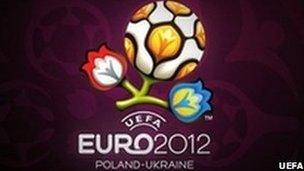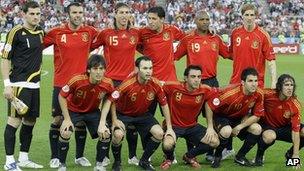Euro 2012 and the eurozone crisis 2011
- Published
- comments

The other Euro battle - on the pitch
In the only euro contest that really matters, the favourite to win is not the disciplined, fiscally watertight German machine - but the flamboyant, free spending jugglers of Spain.
Yes we're talking about Euro 2012, the life-or-death contest for European footballing supremacy - not the more trivial question of which countries are financially robust enough to remain in the eurozone.
As a country's debt rises above a certain threshold, its economic performance seems to suffer. That's why the GDP outlook is a bit grim for Greece, Italy, Spain and Portugal, since they have back-achingly large government debts, or household debts, banking-sector debts or corporate debts.
But countries that are booed and lampooned by investors are not necessarily booed by football supporters.
Here's the thing: at least seven of the Euro 2012 finalists are fiscally challenged. And probably the best footballing nation in the world right now, Spain, has companies that are buckling under their debts, households mortgaged to the hilt and a government struggling to repay what it owes.
Even if the Spanish exchequer expropriated and sold superstar footballers such as Fabegras, Villa and Iniesta, there would be only the tiniest dent in its debt mountain.
Now as some financially astute football analysts have noticed, there could well be a Group of Debt - as opposed to a Group of Death - at the qualifying stage of Euro 2012: it is theoretically possible that Spain, Italy or England, Greece or Portugal and Ireland could all be in the same group.
Let's just hope their respective countries still have the money for the airfare to Warsaw and Kiev, when the time is right.
What hasn't been spotted is that there could also be a group consisting entirely of AAA-rated nations that supposedly have rock solid balance sheets: the Netherlands, Germany, Sweden and France could all be in the same group. Perhaps that should be called the Group of Life.
In this instance, however, football may mirror finance: just as France is widely seen to be past its best in footballing terms, so too is its AAA rating in some jeopardy.
What is clear however is that fiscal crises and footballing crises do not go together. If anything, the qualifiers for the finals of Euro 2012 seem to show that bust countries win more at soccer.

The Spanish side that won Euro 2008
That shouldn't be a surprise. In a global context, Brazil and Argentina have been among the world's great defaulters and also - to use a terrible Americanism - the winningest football nations du monde.
Against such a background, the Teutonic fiscal and sporting discipline of Germany, which has delivered footballing and economic success, is the exception to the golden rule of soccer - which is apparently that prizes go to the profligate, silverware to the spendthrift.
And what about the Italians, so organised and defensive in their football when on the pitch, so disorganised and reckless in their politics and fiscal management?
Well the captain of the national football team, Gianluigi Buffon, declared that the Italian people require "a political class which is cohesive, cultured and responsible" - or, in this instance, a cabinet of technicians and professionals that follows the example of the famous azzurri.